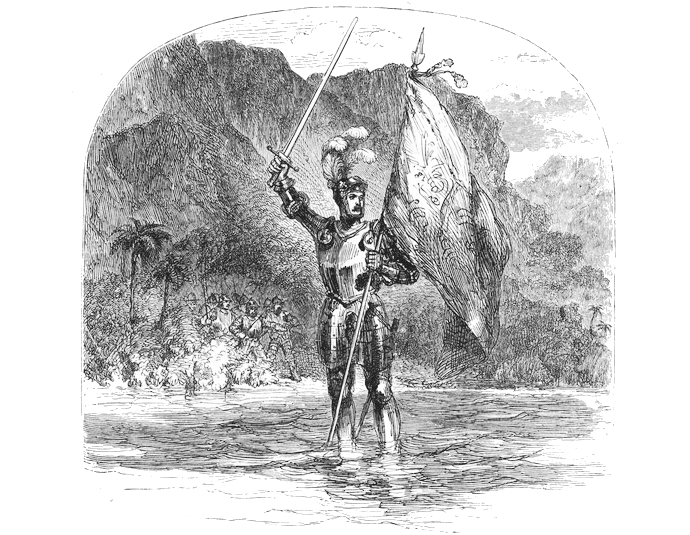Vasco Núñez de Balboa, discovered on somebody else’s beach.
The Balboa myth
by Olmedo Beluche
As anthropologist Ana Elena Porras would say, the Panamanian ruling class has constructed an “origin myth,” both of Panamanian identity and of itself. It’s the Balboa myth. According to this story, Balboa, upon discovering the South Sea, founds the Panamanian “nation” and endows it with its commercial vocation, an isthmus called to be a transit area for goods and people, a bond that unites the oceans. Vasco Núñez would not be a bloodthirsty conqueror, like others, but a brave and fierce explorer, who knew how to be “a friend of the Indians” and who, moreover, “married” a beautiful “native” with whom he was in love and who, among her charms, would have spoken to him of the “other sea.” So goes the story by Octavio Méndez Pereira, a fictionalized novel that is assumed to be historical truth.
Unlike the Mexican Malinche, who is considered a traitor to her people, here the mythical Anayansi is the intelligent benefactor of the indigenous people who early on understood that the way to “progress” was by subordinating themselves to the European whites. The “cream” of our ruling class identifies itself with Balboa, as they are members of an endogamous oligarchy that takes care of the “whiteness” of the “legitimate” progeny, even if it has sporadic “escapes” with some Anayansis. Mentally, they feel European or, better, North American — in short, foreigners settled on an isthmus from which the transit is used. Whatever contradicts the myth is repudiated because it calls into question not only Balboa, but the essence of the “Panamanian nation,” its supposed transit hub vocation and, therefore, their business interests.
Myths always contain a gram of truth. The event starring Balboa, linked to those of Christopher Columbus, Magellan and others, created a new world intertwined by trade and the beginning of a “universal history,” a common history of all the peoples of the world, as Omar Jaen Suarez recently put it. In this “globalized” world, Panama has had to play its role as a hub through which a good part of international trade flows.
The problem is that, and here the myth ends, the conquest by Vasco Núñez de Balboa, both of the Darien, the Isthmus of Panama, and the South Sea, was a tremendously violent event. It imposed a relationship of domination and political subjugation, as well as one of economic exploitation, in which the northern powers control and plunder the southern countries. Within the scope of the Panamanian state, as Guillermo Castro Herrera would say, those who control the transit zone subordinate in every way the rest of the inhabitants of the isthmus.
It’s logical that those who benefit from the current state of affairs want an idyllic tale about Balboa, in which there is no mention of the killings, the cavalcades, the use of attack dogs, the kidnapping and rape of women, the thousands who succumbed in the gold washes and mines, the fiefdoms that were granted over land and people, and the slavery. To kill the myth of Balboa is to explain the social injustices of the 21st century, the low wages of the cholos and the extreme poverty of the indigenous people.
Contact us by email at fund4thepanamanews@gmail.com
To fend off hackers, organized trolls and other online vandalism, our website comments feature is switched off. Instead, come to our Facebook page to join in the discussion.
These links are interactive — click on the boxes












